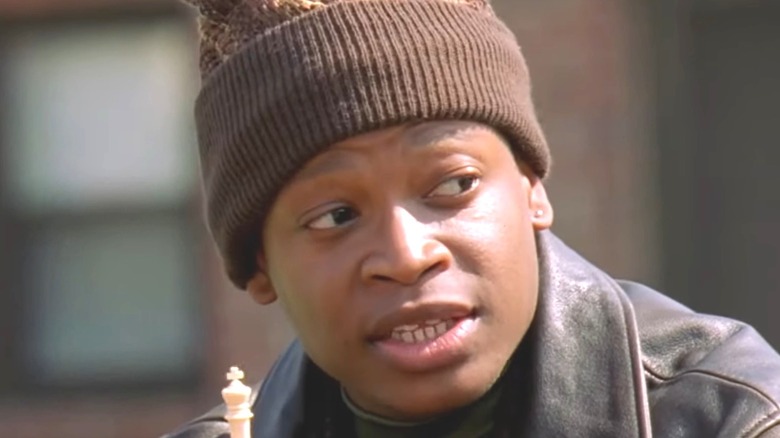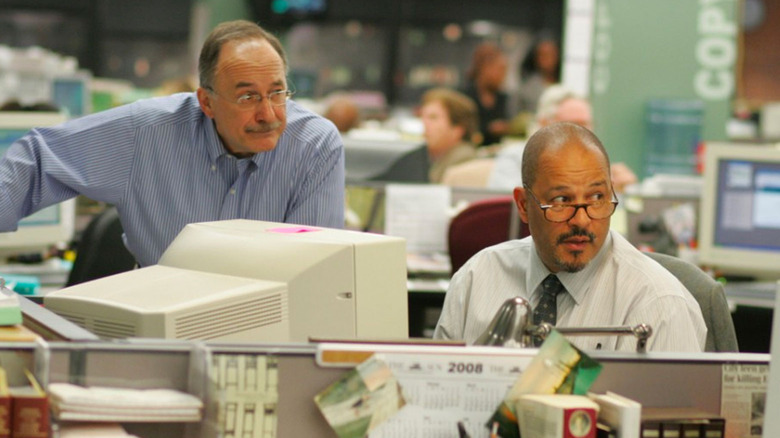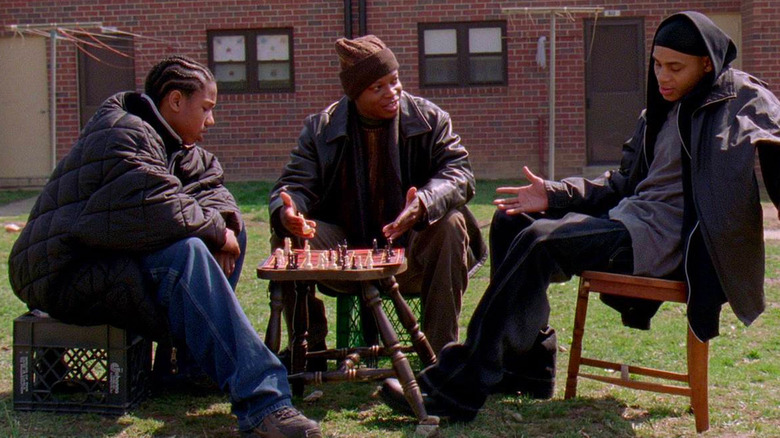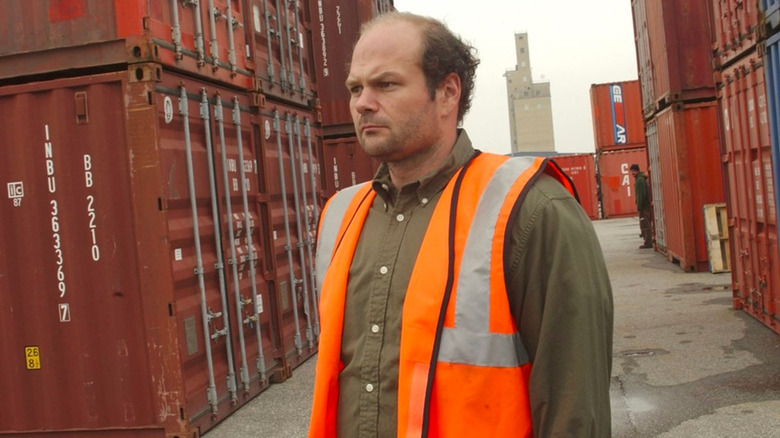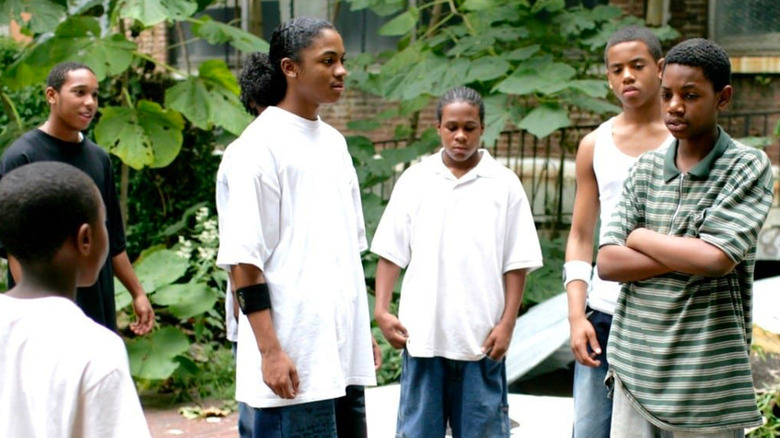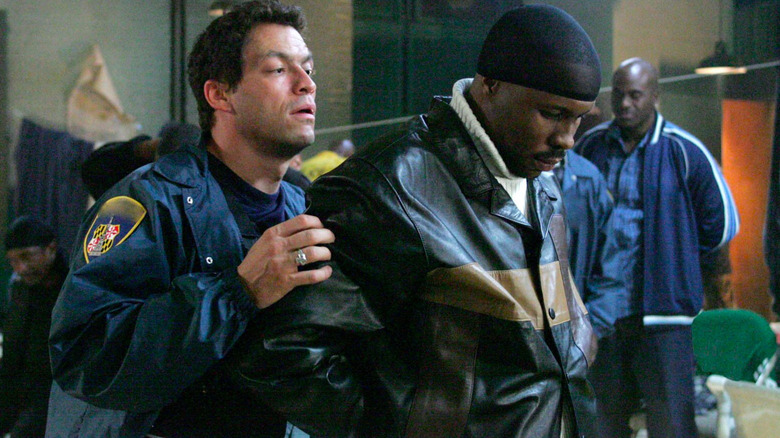Every Season Of The Wire Ranked Worst To Best
Following a BBC poll taken by critics around the world, David Simon and Ed Burn's engrossing Baltimore-based drama about drugs, corruption, and the illusive Fuzzy Dunlop, "The Wire," was voted as the greatest TV show of the 21st century. The tightly woven story of the crime on both sides of the law was more than just cops and robbers: it showed characters in one of the rawest true-to-life settings ever put on the box, which, according to voters, was enough to outrank the likes of even "Breaking Bad" and "Game of Thrones."
With that in mind, it's nearly impossible to determine just which of the five seasons that made up this game-changing series is the best of the bunch, isn't it? Could we really determine which specific part of this city-set saga stands above the others, and reminds us why "The Wire" is such a great show to go back to? Well, to quote a late, great stick-up boy himself, "Oh, indeed."
Season 5 doesn't quite make the headlines
While any achievement aims to end on a high note, the final season of "The Wire" didn't quite manage to deliver what had come before it. That's not to say it wasn't good, of course. There are primetime shows that aren't worth sniffing the curbs that the worst episodes of "The Wire" were shot on. That being said, for a series so focused on bringing true-to-life stories and unflinching insights to the masses, Season 5 does stretch beyond the reality it built for itself.
It seems almost surprising that former reporter, David Simon, conjures a pretty out-there story that entangles itself in the realm of journalism. Trainwreck with a badge Jimmy McNulty (Dominic West) reaching the end of the line as a lawman fabricating a murder for the benefit of the police department, is ... quite frankly, nuts. It's a plot thread that reaches almost hilarious lengths — the criminal profile will always gain a giggle — but the resolution doesn't fit the crime, even if it is our favorite Baltimore cop. While other characters meet some resolution (Bubbles' final speech at his meeting will always hit hard in the feels), the imbalance makes a stellar series end on a near-perfect note that was so close to being more. Even so, in the years since its airing, the concept of "fake news" is not an unheard topic anymore. As dedicated reporter Augustus Haynes (Clark Johnson) proclaims, "Our job is to report the news, not to manufacture it." Perish the thought.
Season 1 was before all the pieces mattered
Now, not to besmirch the foundations of one of the greatest television shows in history, but while the first season of "The Wire" certainly delivered groundbreaking television upon its arrival, it was a patch of land that audiences undoubtedly found challenging to cross. More than any other, this series gave meaning to the "just stick with it" mantra, a piece of advice that would eventually apply to other shows, as well. Simon and Burns' opening to a truly brilliant story that would eventually be revered made for the slowest of slow burns, but ultimately, it lit a fire like no other show at that time.
From the first season's "this is America" conversation in its opening episode, to D'Angelo's lesson in chess (to a young Michael B. Jordan, no less), Season 1 kept you invested with a host of complex characters when the likes of "CSI" were in their prime. This wasn't a weekly crime drama, but a series where the most feared criminal, Avon Barksdale (Wood Harris), didn't cross paths with the police until the ninth episode of a 13-episode season. As far as opening chapters go, Season 1 is a long read, but it's undeniably necessary — and equally rewarding — in the process.
Season 2 gets lost in the stacks
Among all the seasons that bind together to make this critically acclaimed show, the sophomore year of "The Wire" feels like a brave experiment that pays off in all the wrong ways. Taking the audience out to the docks so soon after being introduced to the Barksdale organization sparked a plate-spinning act for the show's creators that feels somewhat jarring. Season 2 runs like the start of an anthology formula that was never fully put into effect, focusing on characters that are just as compelling and fleshed out as every other piece in this game — which makes it all the more bittersweet when they're taken off the board, and never seen again.
While keeping an eye on Avon Barksdale and Stringer Bell (Idris Elba) still makes for a great watch, seeing the gradual decline of the Sobotka family is worth a series all on its own. Chris Bauer ("True Blood") is perfect as king of the cans, Frank Sobotka, the good man doing bad things only worsened thanks to his royal pains he calls family. Nick Sobotka (future "Halo" star Pablo Schreiber) is the prodigal son he never had, while his own flesh and blood Ziggy (James Ransome of "It") is the car crash in a fur coat you hate to love. It's another untouched corner of Baltimore that the show's creators handle magnificently, but never going back to it is the biggest crime of all.
Season 4 Is a Class Act
"The Wire" was always set on teaching its audience a lesson, but the fourth season earns the runner-up spot for literally taking us to school this time around. Besides showing the slow transition of criminal power shift to Marlo Stanfield (James Hector), Season 4 introduced us to a small band of school kids that were at risk of being swept up in the life of crime and drugs that was sitting on their doorstep. The absence of Dominic West as McNulty (the unofficial lead, who took a break from the show to spend more time with family) feels totally acceptable given the substituted time spent with young blood that brings new life to the show.
Here we see incredible young actors as kids unknowingly let down by a broken education that will have them slip through the cracks and do absolutely nothing to stop it from happening. Former detective and teacher Mr. Pryzbylewski (Jim True-Frost) is the oblivious saint to these lost causes — determined to change it, but fighting a losing battle doing so. That's what makes this particular season so impactful. It's the certainty that some of these boys are set to become consumed by the wrong side of the war on drugs, and it can't be stopped. As former Barksdale enforcer, Bodie (J.D. Williams) admits, "this game is rigged, man. We like the little b*****s on a chessboard." Lesson learned.
Season 3 is still the best season of The Wire
Simon and Burns could've cut "The Wire" on Season 3 and called it a day if they wanted to. The option was there to end things on a high note by not only finally bringing an end to the feared Barksdale organization, but the unimaginable efforts applied by former Commander Colvin (Robert Wisdom) to tame the drug problem beast by any means necessary. Once again, being able to maintain two worlds seamlessly running alongside one another made for excellent viewing, but no other season came close to the gripping storytelling applied here that earned its spot alongside some of your favorite crime stories.
Seeing the fracture start to appear between longtime friends Avon Barksdale and Stringer Bell feels like something out of a Scorsese film, and watching it unfurl was addictive. Not only that, but it also added more depth to the late Michael Kenneth Williams' flawless performance as Omar Little, who played a valuable part of bringing them down. Revenge, betrayal, and a showdown between Baltimore's most feared stick-up boy and bow-tie-wearing gun-for-hire Brother Mouzone (Michael Potts), made for simply epic television. In the masterpiece of storytelling that was "The Wire," the third season was, without a doubt, the winning stroke.
